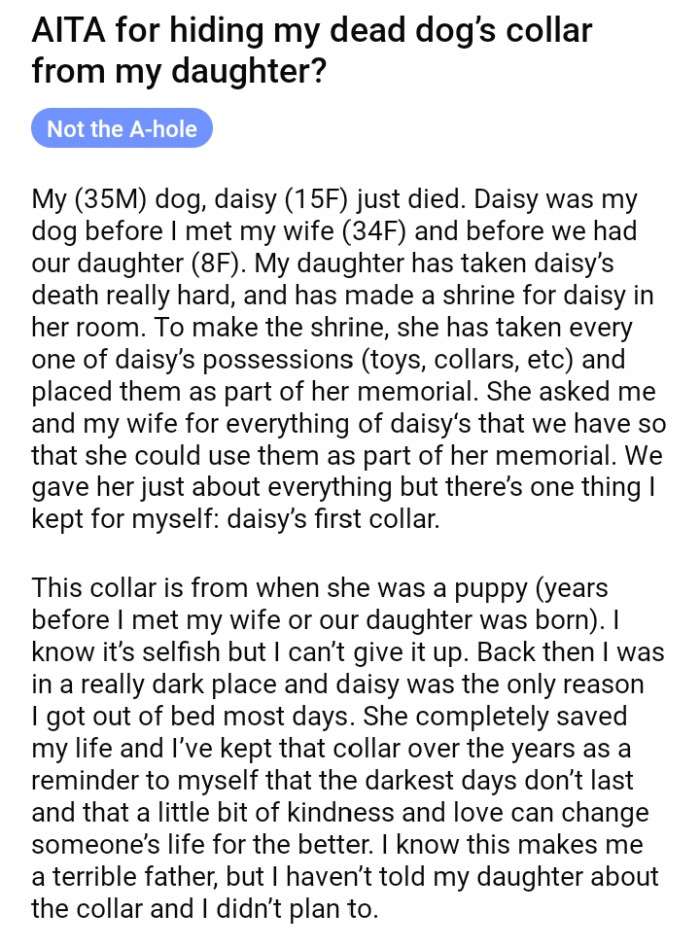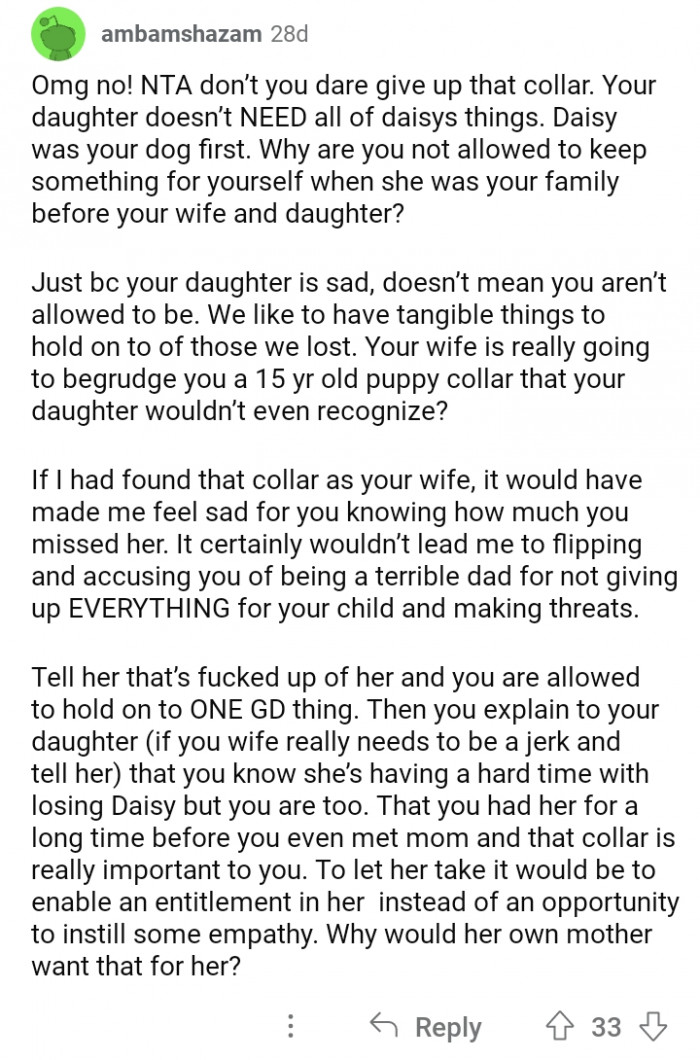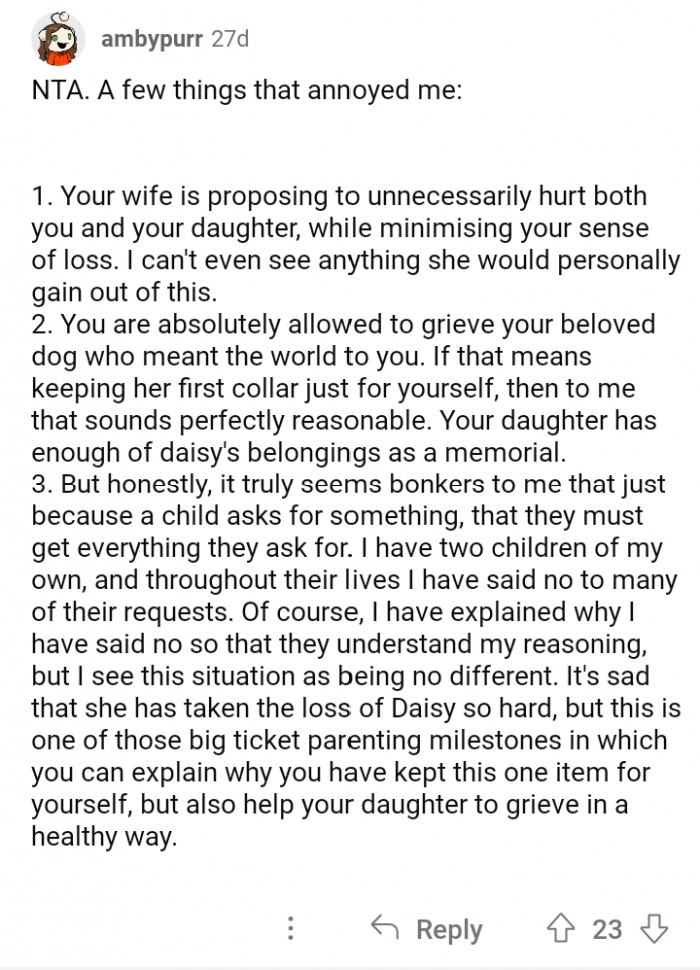Dad Asks Redditors If He Is Wrong For Hiding His Dead Dog's Collar From His Daughter And This is How The Online Community Responded
Owning a pet has numerous advantages, from security to companionship. As every fur parent knows, owning a pet unfortunately includes one major disadvantage: every animal dies at some point.
It is a terrible truth that nobody ever wants to comprehend due to the massive weight of death. You can compare the loss of a furry friend to the death of a loved one, which may be just as painful.
Despite what some may think, it is more than simply words. Anyone who has experienced the death of a furry friend understands the magnitude of the grief, from the unused food bowls to the lonely strolls down the street and the homes that are suddenly silent.
Research conducted in recent years has shown that the death of a pet may have profound impacts on a person's emotional well-being and mental state. This may be challenging to comprehend for people who have never owned a pet or have never had a particularly strong relationship with one of their pets.
Still, these findings have been demonstrated by many studies in recent years. Many pet owners believe their dog or cat to be family, and they are sometimes easier to love than biological relatives.
Because humans spend a lot of time with their animals, human interactions tend to become less complex. However, when the time comes that people are faced with a pet's death, they tend to do things that help them cope with the loss.
One example is what happened to a Reddit user who opened up about how he kept his dead dog's old collar to remind himself of his dark days when his dog helped him through tough times. His wife was upset with him for keeping it because their daughter asked him for everything their dog owned for the memorial, and this is how the Redditors responded.
OP: Hiding my dead dog's collar from my daughter

How his wife found out.

#1 Is your wife trying to hurt everyone?

The emotional bond between humans and pets is profound and well-documented in psychological research. According to a study published in the Journal of Personality and Social Psychology, pet ownership can significantly enhance emotional well-being, providing companionship that mitigates feelings of loneliness and depression. This bond often leads to deep grief when a pet passes away, comparable to the loss of a family member. Research indicates that people may experience symptoms of grief such as sadness, anger, and confusion, reflecting the intense attachment formed over time.
Understanding this connection is crucial for parents navigating the complexities of their child's grief, especially when the pet was also a part of the family unit. The emotional landscape surrounding pet loss can be complicated, and it's essential to validate these feelings in both adults and children.
#2 I cannot sense a little of her "understanding" here.

#3 Family must understand the parts they were not still part of, right?

#4 Don't you dare give up that collar!

A clinical psychologist specializing in grief and loss points out that the process of mourning a pet can initiate important conversations about death and loss within families. Studies show that children's understanding of death evolves significantly as they grow, and discussing the loss of a beloved pet can be an opportunity to help them develop a more nuanced perspective on mortality. Engaging in these discussions can foster emotional resilience and prepare children for the inevitabilities of life.
Experts recommend creating a safe space for children to express their feelings about the loss. This can include sharing memories, creating a scrapbook, or even holding a small memorial. Such activities not only honor the pet's memory but also facilitate healthy grieving processes.
#5 I mean, the kid's innocence would've understood it better than your wife.

#6 Do they have to have our past too?

#7 Opportunity to teach empathy.

The Role of Memory in Grief
Memory plays a significant role in how we process grief, especially in the context of losing a pet. Research by cognitive psychologists has shown that memories associated with strong emotions are often more vivid and easier to recall, which can intensify feelings of loss. The act of remembering a pet through their belongings, such as a collar, can elicit both comfort and pain. A study published in the journal Memory has found that reminiscing about the positive experiences shared with a pet can help mitigate some of the grief, allowing individuals to celebrate the pet's life rather than solely focus on the loss.
This principle can be applied practically by encouraging families to share stories about their pets. Setting aside time for family members to recount their favorite memories can transform the focus from grief to gratitude, which is essential for healing.
#8 Maybe your wife has past traumas too?

#9 Nothing's wrong with your values.

#10 What is she trying to do?

Research on parental grief indicates that how parents manage their own grief can significantly impact their children's grieving process. A study published in the Journal of Family Psychology found that parents who openly express their emotions provide a model for their children, allowing them to feel safe in expressing their own grief. Conversely, if parents conceal their sorrow or avoid discussions about loss, children may internalize these feelings, leading to maladaptive coping mechanisms.
Experts suggest that parents should aim for emotional transparency, discussing their feelings and encouraging their children to do the same. This can foster a supportive environment that validates each family member's experience and encourages healthy emotional processing.
#11 Just keep the collar.

#12 Indeed, the wife is shocking.

#13 The dude does not have to feel bad.

Coping Strategies for Grief
In dealing with the loss of a pet, implementing coping strategies can be incredibly beneficial for both parents and children. Psychological research emphasizes the effectiveness of expressive writing as a tool for processing grief. A study published in the Journal of Clinical Psychology found that individuals who engaged in writing about their feelings experienced a decrease in symptoms of depression and anxiety compared to those who did not. This method allows individuals to articulate their emotions and make sense of their experiences.
Encouraging family members to keep a grief journal can provide a constructive outlet for emotions. Additionally, engaging in mindfulness practices, such as meditation or deep-breathing exercises, can help manage intense feelings of grief and promote emotional regulation during this difficult time.
#14 Thought I was the only one seeing her one-sided opinion.

#15 A talk is a must here.

#16 What if the wife is lowkey jealous of his sentiments?

A social psychologist explains that societal norms surrounding grief can sometimes complicate personal experiences. In many cultures, there’s a tendency to minimize the loss of a pet compared to human loss, which can lead to feelings of isolation for grieving individuals. Research published in the journal Death Studies highlights that individuals grieving a pet often feel that their grief is invalidated by society, leading to a lack of support when they need it most. This phenomenon underscores the importance of fostering environments where all forms of grief are acknowledged.
Creating support groups or online forums dedicated to pet loss can provide a valuable resource for individuals feeling isolated in their grief. These communities can allow individuals to share their experiences and receive empathy from others who understand their pain.
#17 Be honest and keep the collar.

#18 Part of parenting milestone.

#19 Whichever way I look at it, your feelings are all valid.

Navigating Children's Grief
Children process grief differently than adults, often requiring tailored approaches to help them cope effectively. Research from the American Psychological Association reveals that children may not fully grasp the permanence of death and often oscillate between sadness and normal play behaviors. This developmental understanding means that parents should be prepared for a range of emotional responses, from anger to withdrawal. Experts recommend using age-appropriate language and being honest about the pet's death while also providing reassurance.
Involving children in the memorialization process can also be therapeutic. Activities such as creating a memory box or participating in a ritual to honor the pet can help children express their feelings and understand their grief in a constructive manner.
#20 Emotional blackmail?

After the passing of a beloved pet, some individuals feel the necessity to immediately remove the items associated with their animal companion, while others will try to take matters slower.
If you find it difficult to get rid of your furry friend's possessions, take it one step at a time. Keep in mind that there really is no correct or incorrect approach. In the end, it's all about you and what works best for you.
Psychological Analysis
The dad's decision to hide his dog's collar likely stems from his own grief and desire to hold onto a piece of his beloved pet, reflecting a common coping mechanism during loss. This behavior highlights how individuals often struggle between wanting to preserve memories and the need to facilitate healing, especially when children are involved. It’s important for parents to model emotional transparency, as this can help both them and their children process grief in a healthy way.
Analysis generated by AI
Building Healthier Patterns
In summary, the emotional landscape surrounding the loss of a pet is complex and filled with nuances that require sensitivity and understanding. Research consistently shows that open communication and validation of feelings can significantly aid both parents and children in navigating their grief. As noted in studies on grief and loss, creating opportunities for shared reflection and emotional expression can facilitate healing processes, allowing family members to honor their beloved pet while also learning essential lessons about love, loss, and resilience. With appropriate support, families can transform their grief into a meaningful tribute that honors the pet's role in their lives.



